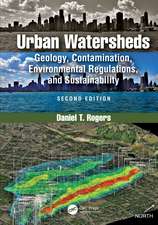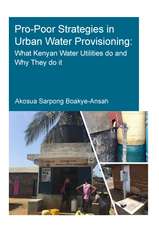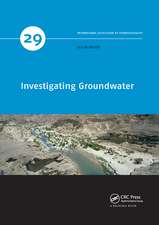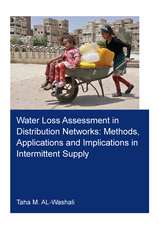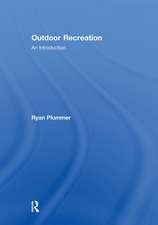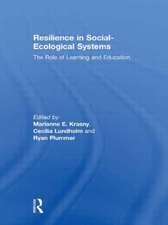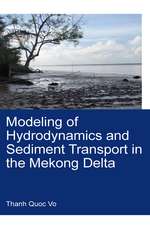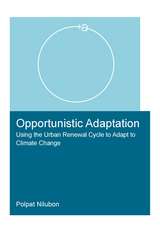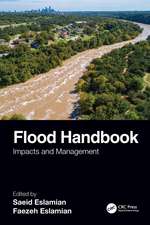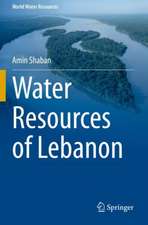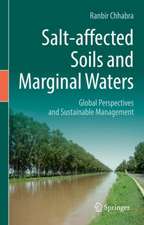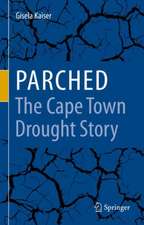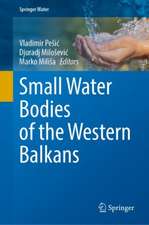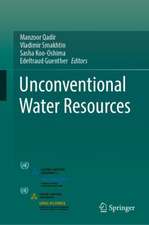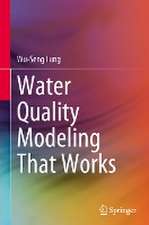Water Resilience: Management and Governance in Times of Change
Editat de Julia Baird, Ryan Plummeren Limba Engleză Paperback – 23 sep 2021
| Toate formatele și edițiile | Preț | Express |
|---|---|---|
| Paperback (1) | 502.91 lei 38-45 zile | |
| Springer International Publishing – 23 sep 2021 | 502.91 lei 38-45 zile | |
| Hardback (1) | 685.80 lei 38-45 zile | |
| Springer International Publishing – 22 sep 2020 | 685.80 lei 38-45 zile |
Preț: 502.91 lei
Preț vechi: 620.88 lei
-19% Nou
Puncte Express: 754
Preț estimativ în valută:
96.23€ • 100.47$ • 79.64£
96.23€ • 100.47$ • 79.64£
Carte tipărită la comandă
Livrare economică 31 martie-07 aprilie
Preluare comenzi: 021 569.72.76
Specificații
ISBN-13: 9783030481124
ISBN-10: 3030481123
Pagini: 311
Ilustrații: X, 311 p. 23 illus., 18 illus. in color.
Dimensiuni: 155 x 235 mm
Ediția:1st ed. 2021
Editura: Springer International Publishing
Colecția Springer
Locul publicării:Cham, Switzerland
ISBN-10: 3030481123
Pagini: 311
Ilustrații: X, 311 p. 23 illus., 18 illus. in color.
Dimensiuni: 155 x 235 mm
Ediția:1st ed. 2021
Editura: Springer International Publishing
Colecția Springer
Locul publicării:Cham, Switzerland
Cuprins
Part I: Introduction.- Chapter 1. The Emergence of Water Resilience: an introduction.- Part II: Examining water systems through the lens of resilience.- Chapter 2. Water Policy and Governance in Transition: The EU Water Framework Directive.- Chapter 3. The Sustainable Groundwater Management Act (SGMA)—California’s Prescription for Common Challenges of Groundwater Governance.- Chapter 4. Water Policy Reform for Sustainable Development in the Murray-Darling Basin, Australia: Insights from Resilience Thinking.- Chapter 5. Reducing Nutrient Loading from Agriculture to Lake Ecosystems – Contributions of Resilience Principles.- Chapter 6. Reconfiguring water governance for resilient social-ecological systems in South America.- Part III: Exploring the conceptual boundaries and bridges of water resilience.- Chapter 7. Capacities for watershed resilience: persistence, adaptation, and transformation.- Chapter 8. Adaptive Governance in North American Water Systems: a legal perspective on resilience and reconciliation.- Chapter 9. Cross-scale Governance for Urban Water Resilience in Bengaluru and Cape Town.- Chapter 10. Facing Change: Understanding Transitions of River Basin Policies Over Time.- Chapter 11. Conditions and Cautions for Transforming Ocean Governance.- Chapter 12. Extraordinary governance to avoid extraordinary events. Part IV: Conclusion.- Chapter 13. Charting a course for management and governance dimensions of water resilience.
Notă biografică
Julia Baird’s research interests centre around water. She agrees with the notion that water issues are ultimately issues of governance, and so her research focuses on human dimensions of water resources. Within this broad area, she is particularly interested in:
Ryan Plummer’s multi-faceted program of research broadly concerns the governance of social-ecological systems. In striving to advance knowledge of collaboration and adaptation within complex systems, he has focused on the exploring their theoretical underpinnings and ethical implications, modeling their processes, examining the roles of social capital, and investigating the influences of social learning. Water resources are the context in which his research mainly occurs and he is a Faculty Investigator in the Water Policy and Governance Group. Findings from his research have been published in leading international journals such as Ecological Economics, Ecology and Society, Environmental Management, Frontiers in Ecology and Society, Global Environmental Change, Journal of Environmental Management, Society and Natural Resources and the UN journal, Natural Resources Forum. In addition, he is the author of Outdoor Recreation (Routledge, 2010), and co-editor of Adaptive Capacity and the Making of Environmental Governance (with D. Armitage, Springer, 2010) and Resilience in Social-Ecological Systems: the Role of Learning and Education (with M.E. Krasny and C. Lundholm, Routledge, 2011). He serves as a Subject Editor for Ecology and Society.
The scholarly quality of his research program was formally recognized in 2008 with the awarding of a Chancellor’s Chair for Research Excellence. In 2004 he received the Faculty of Applied Health Sciences Award for Teaching Excellence and in 2008 he was selected as one of the Canada Mortgage and Housing Corporation (CMHC) Excellence in Education Award winners for Promotion of Sustainable Practices.
- building an understanding of how (and why) people engage in water management and governance, and how the qualities of these processes relate to social and ecological outcomes;
- how the concept of resilience relates to water governance, and how it is operationalized and applied in practice; and,
- applying the notion of social-ecological systems to agriculture, how these kinds of systems can be modeled, and how those models can be used to improve decision making about practices that influence water resources on agricultural landscapes.
Ryan Plummer’s multi-faceted program of research broadly concerns the governance of social-ecological systems. In striving to advance knowledge of collaboration and adaptation within complex systems, he has focused on the exploring their theoretical underpinnings and ethical implications, modeling their processes, examining the roles of social capital, and investigating the influences of social learning. Water resources are the context in which his research mainly occurs and he is a Faculty Investigator in the Water Policy and Governance Group. Findings from his research have been published in leading international journals such as Ecological Economics, Ecology and Society, Environmental Management, Frontiers in Ecology and Society, Global Environmental Change, Journal of Environmental Management, Society and Natural Resources and the UN journal, Natural Resources Forum. In addition, he is the author of Outdoor Recreation (Routledge, 2010), and co-editor of Adaptive Capacity and the Making of Environmental Governance (with D. Armitage, Springer, 2010) and Resilience in Social-Ecological Systems: the Role of Learning and Education (with M.E. Krasny and C. Lundholm, Routledge, 2011). He serves as a Subject Editor for Ecology and Society.
The scholarly quality of his research program was formally recognized in 2008 with the awarding of a Chancellor’s Chair for Research Excellence. In 2004 he received the Faculty of Applied Health Sciences Award for Teaching Excellence and in 2008 he was selected as one of the Canada Mortgage and Housing Corporation (CMHC) Excellence in Education Award winners for Promotion of Sustainable Practices.
Textul de pe ultima copertă
This book synthesizes current knowledge and understanding of management and governance in the context of water resilience; advances theory through synthesis of research and experiences from a variety of disciplinary perspectives. The book highlights the implications of theory and experience for innovation in practice and policy; and it explores frontiers and future research. The book further addresses the need for a consolidated, interdisciplinary approach to the theoretical advances and practical implications of water resilience for academics, resource managers, aid organizations, policy makers and citizens.
Caracteristici
Explores the practical implications of water resilience Offers insights into new water paradigms for future water resilience Highlights the implications of theory and experience for innovation in practice and policy Offers insights on frontiers and future research of water resilience





